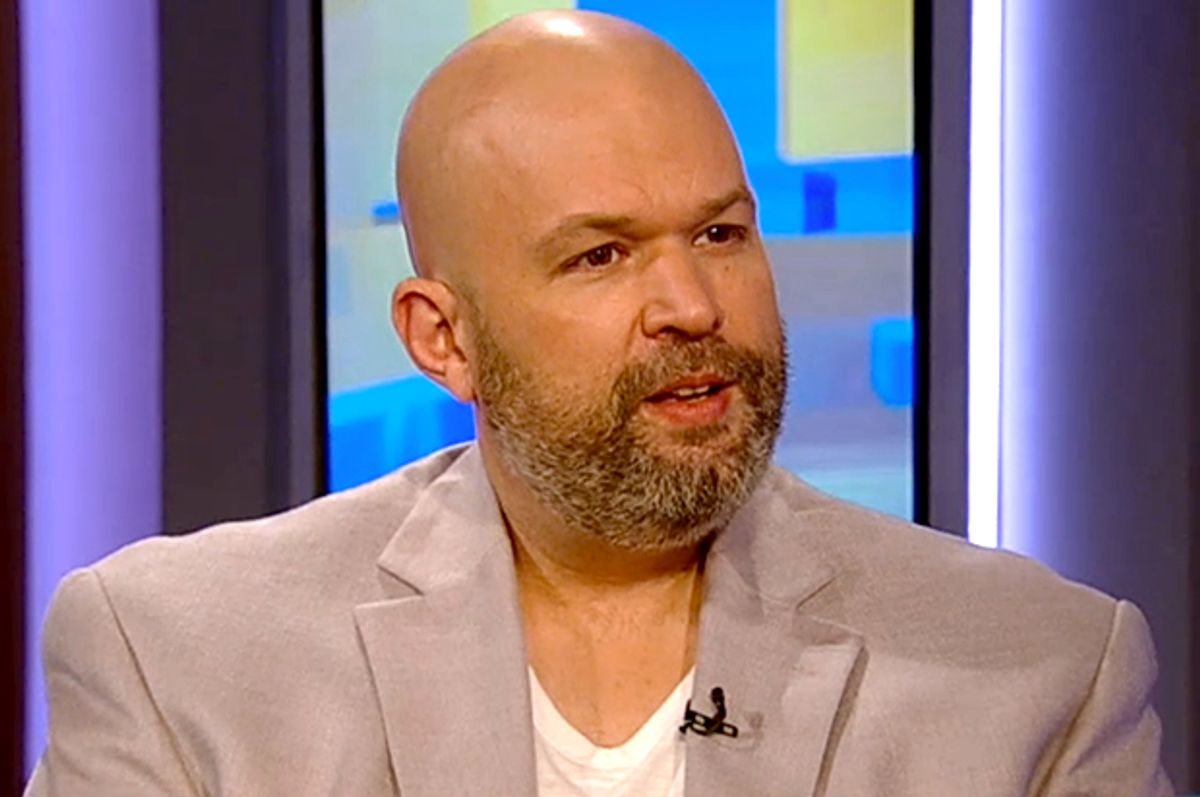Breaking News: National Review writer Kevin Williamson went to a mostly black city and survived to write about it! Barely survived, according to his account -- he was heckled multiple times, including once by a child, fer chrissake. And like any good journalist scoping out a scene, Williamson chooses not to speak to the people he's covering to get a more empathetic understanding of his subject matter; instead he just mocks everyone in an arch, and some might say extremely racially loaded, extended metaphorical riff on Joseph Conrad's "Heart of Darkness."
Here is Williamson's opening, wherein we've taken the liberty of bolding the instances of lax editorial oversight:
East St. Louis, Ill. — ‘Hey, hey craaaaaacka! Cracka! White devil! F*** you, white devil!” The guy looks remarkably like Snoop Dogg: skinny enough for a Vogue advertisement, lean-faced with a wry expression, long braids. He glances slyly from side to side, making sure his audience is taking all this in, before raising his palms to his clavicles, elbows akimbo, in the universal gesture of primate territorial challenge. Luckily for me, he’s more like a three-fifths-scale Snoop Dogg, a few inches shy of four feet high, probably about nine years old, and his mom — I assume she’s his mom — is looking at me with an expression that is a complex blend of embarrassment, pity, and amusement, as though to say: “Kids say the darnedest things, do they not, white devil?” It’s not the last challenge like this I’ll get here where the sidewalk ends, or the most serious one. I start off in Hinsdale, Ill., hometown of Pat Quinn, America’s Worst Governor™, a borough of stone mansions and yoga-panted women with vastly complex Starbucks orders, where I admire the Gordon Abbott house designed by the draftsman William Drummond from Frank Lloyd Wright’s shop, and then journey Marlow-like down U.S. 55, the dyspeptic alimentary canal of Illinois, from the shadows underneath the gloomy turret of the Joliet penitentiary to the stagnation of Normal and Bloomington, across the vast stretches of lightly populated Corn Belt and through the almost-as-empty state capital at Springfield, where the only sign of life is a convention of legionnaires in their jaunty, flare-intensive garrison caps, then onward and downward toward the Mississippi until finally arriving at my terminus in East St. Louis, where instead of meeting my Kurtz I get yelled at by a racially aggrieved tyke with more carefully coiffed hair than your average Miss America contestant.
Further florid descriptions of East St. Louis abound throughout the piece. There are the city's "Amazonian clusters of weeds and wildness" throughout the "urban jungle," and another reference to "my three-fifths-scale Snoop Dogg." There is this observation: "In this 98 percent–African-American city, the only people I see doing anything like legitimate and productive semi-private-sector work are white guys in pickup trucks, namely the Lowry Electric crews who are out working on streetlights." It is the sort of sneering tone you would not suspect from a National Review writer covering poverty, in say, Appalachia.
The piece is a lengthy look at Illinois under Democratic Gov. Pat Quinn. Williamson's tone suggests that he believes he's writing a landmark piece of literary political journalism, but beyond all the dicey metaphor, he's mostly just getting around to a common question that conservatives ask, snicker, pat themselves on the back for asking, and then move on to the next thing without really caring to hear the potentially painful answer: Why don't impoverished black people vote for Republicans since Democrats haven't lifted all them out of poverty yet?
Aside from the fact that a lot of people, white and black, are still in poverty because sweeping anti-poverty programs have been rolled back over the past few decades by conservative Republicans and neoliberals, there's also a more ground-level explanation here. African-American voters tilt so heavily Democratic because Republicans don't even bother to win their vote! In presidential campaigns, the Republican nominee's standard one-per-cycle attempt to reach out to majority-black audiences is giving a speech at the NAACP convention, and by "speech" we mean "lecture." In midterm, base-driven cycles, appeals to the old white vote are all that's necessary.
The first part of trying to win the vote of a community is trying to win the vote of a community. That's the critical distinction that professor Jelani Cobb makes today in an excellent New York Times Op-Ed, "Can the G.O.P. Ever Attract Black Voters?" His answer is mostly "no," but he does lay out the necessary first step if it's ever going to happen: "An honest appeal to African-Americans would start with the admission that Republicans didn’t lose the black vote but forfeited it. The Republican Party now faces the same dilemma as the mid-20th-century Democratic Party: whether its interest in black voters might ever outweigh its investment in the reactionary politics of race." In other words, an "honest appeal" to win African-Americans would require eating some existing assets: the segment of white voters who vote GOP because of the party's antipathy to African-Americans. This was the explicit strategy drawn up by Nixon aide Pat Buchanan during the coalitional shifts of the '60s and '70s: for the Republican Party to wean away conservative white Democrats by exploiting tensions with black Democrats -- in Buchanan's words, to "cut the Democratic Party and country in half; my view is that we would have far the larger half."
Well, the Republican Party doesn't have the larger half anymore. Whatcha gonna do about that, fellas? Not writing racist mockeries of poor black people would be a very, very modest start.

Shares